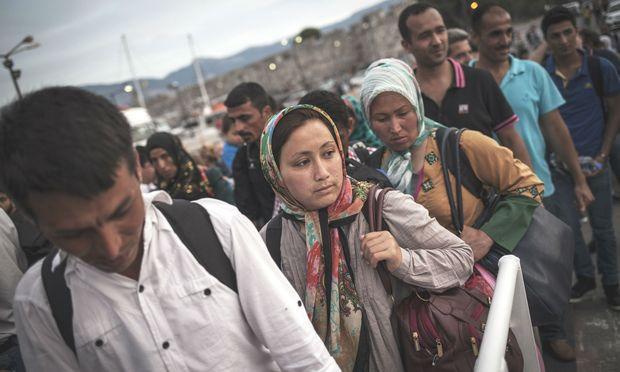US officials commit to increasing refugee admissions over the next several years
Refugees and migrants line up to board a night ferry from the Greek island of Kos to Athens. Refugees and migrants line up to board a night ferry from the Greek island of Kos to Athens.
This year alone, about 442,400 refugees have arrived in Europe by sea, while nearly 3,000 people have died or gone missing trying to cross the Mediterranean. Though a number of European nations are working to address this growing crisis, the United States has finally committed to do more.
In the last year, the US has accepted just 1,500 Syrian refugees. The United States normally takes in about 70,000 refugees a year from nations around the globe, but over the weekend, Secretary of State John Kerry said that number would rise to 85,000 in 2016, and to 100,000 in 2017.
It’s expected that many of the additional refugees the US plans to take in will be from the Middle East, and Syria specifically.
“In the 4.5 years [of the Syrian civil war], they have not been able to start new lives,” says Anne Richard, US assistant secretary of state for population, refugees and migration. “They’ve been able to live in a sort of suspended situation, but their families are very interested in seeing breadwinners go to work and children get enrolled in school.”
About 250,000 have died in the Syrian civil war, and the conflict has forced about 12 million people to flee their homes. Richard says many of the refugees seeking asylum in Europe (about 428,735 between April 2011 and August 2015) are seeking better lives for themselves and their families.
“All human beings want to do that,” she says. “I think many Americans can sympathize with families trying to find a way to live productive, fulfilling lives.”
The US plans to take in at least 10,000 Syrian refugees in the coming year, the White House announced earlier this month. But getting these individuals settled on American soil will be a challenge.
“The process that we have takes 18 to 24 months,” Richard says. “The process has many stages to it — families are referred by the UN Refugee Agency to us, and we are open to accepting some of the most vulnerable people. But we have to have a case put together for them, and then have that case reviewed by an officer from the Department of Homeland Security to ensure that people qualify as refugees — that the reasons they’re fleeing meet our laws — and to also ensure that their background checks out.”
Richard says most people applying for this special status are indeed refugees, however, she says the State Department must verify that these individuals are not “people who have lied to us, are criminals or are terrorist trying to sneak into the United States.”
But the crisis is not getting any less dangerous — this weekend alone, two separate incidents involving boats carrying refugees in the Mediterranean left some 40 people dead or missing. In light of such events, some have criticized the US government, arguing that America needs to relax the process in order to make it easy for those fleeing war, persecution and violence to find safety.
“The vast majority of refugees coming to the United States are people who will never get in trouble in the United States, and will turn out to be great residents of our country,” says Richard. “Many end up being taxpayers, local community leaders, and some even become truly great Americans — we’ve had two secretaries of state who came to the United States as refugees, including my former boss, Madeleine Albright.”
“I agree that most of these applicants do not pose a threat to the United States. But there is a real concern in Congress that we should be extra careful in who gets brought across our borders. This is the most heavily vetted program for any program for travelers to the United States.”
Though some argue the vetting process is vital to national security, others contend that the process has racist and xenophobic undertones, especially in light of the current climate in the United States: Just last week, a supporter of GOP presidential candidate Donald Trump said that "radical Muslims" are a problem in the United States, and fellow candidate Ben Carson argued that Islam is “incompatible with the Constitution” over the weekend.
“I don’t think we profile based on race — we have brought more Africans [to the US] in the last five years than any other time,” says Richard. “But I am worried that, in the mind of the public, they may be extra concerned about bringing Muslims from the Middle East.”
Richard says she personally believes that these refugees can thrive in the United States — a nation founded on the basis of freedom of religion. But the public at large is not in lock step with her personal beliefs.
“I do worry sometimes that there’s some Islamophobia that is behind some of the concerns about security,” she says. “But there is an appropriate concern about security that I must respond to.”
This story first aired as an interview on PRI's The Takeaway, a public radio program that invites you to be part of the American conversation.
